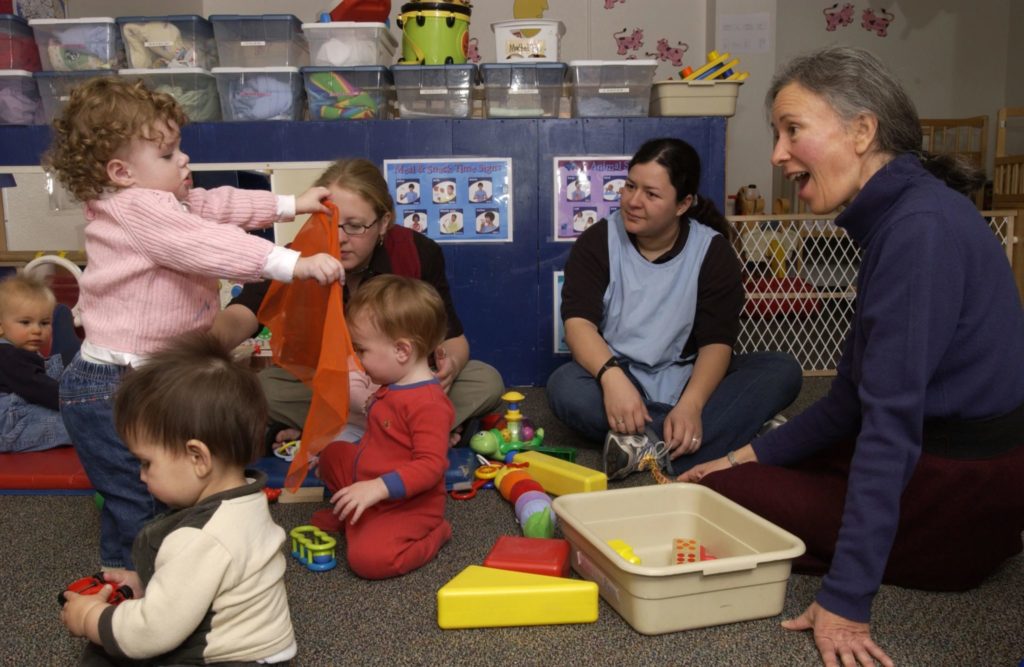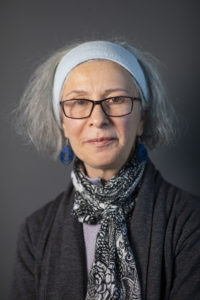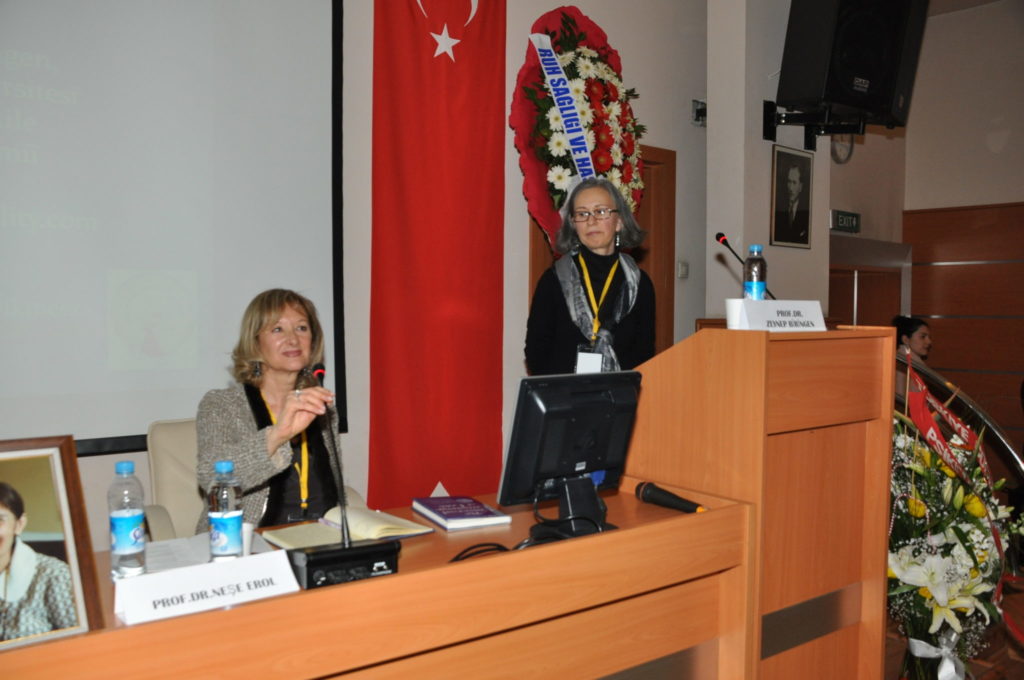
Zeynep Biringen in 2005 at the CSU Early Childhood Center working with children and childcare professionals on emotional connection.
After 25 years as a faculty member in the Department of Human Development and Family Studies, Zeynep Biringen is retiring from Colorado State University with the distinction of professor emerita. Biringen is known for her ground-breaking research in the area of parent-child attachment and emotional availability.
“Dr. Zeynep Biringen is internationally known for her research on adult-child relationships, particularly in the area of emotional availability,” said Lise Youngblade, dean of the CSU College of Health and Human Sciences. “Over the past 30 years, she has developed and refined a tool, the Emotional Availability System, that is used clinically and in research worldwide and across the U.S.”
Starting and ending with the green and gold, Biringen began her faculty career at CSU as an assistant professor in 1996. Immersing herself in the Department of Human Development and Family Studies, Biringen stayed involved with everything, from chairing numerous faculty searches to representing the department on the College of Health and Human Sciences diversity committee.
“When I first started, I never thought for a minute I would stay in one place for 25 years,” said Biringen. “Over time, the department has become like family. I think that speaks well of the institution.”
Biringen earned her bachelor’s degree in psychology from the State University of New York at Binghamton, master’s degree in early childhood education from Stanford University, and doctoral degree in psychology from the University of California at Berkeley. After graduation, Biringen did a MacArthur postdoctoral fellowship with the University of Colorado, School of Medicine’s Department of Psychiatry with renowned psychiatrist, Dr. Robert N. Emde. She then had a child clinical internship at Montefiore Hospital of the Albert Einstein College of Medicine in New York City.
After her postdoctoral fellowship, Biringen spent a year doing therapy with children and families who are at high risk in Boulder, Colorado. As she worked with this community, she wanted to dive deeper into independent research and answer questions she had on how she could do more for them through science. The research and teaching role in CSU’s Department of Human Development and Family Studies was the perfect opportunity to launch her own research.
Making waves for emotional attachment and availability research
 “Zeynep has done so much for our department in the last 25 years,” said Julie Braungart-Rieker, department head of Human Development and Family Studies. “Her scholarly work on emotional availability has strongly influenced the field of early childhood development and attachment.”
“Zeynep has done so much for our department in the last 25 years,” said Julie Braungart-Rieker, department head of Human Development and Family Studies. “Her scholarly work on emotional availability has strongly influenced the field of early childhood development and attachment.”
Biringen started the Emotional Attachment and Emotional Availability Lab, which has become an internationally recognized research program on the topics of attachment and emotional availability in parent-child relationships.
Biringen developed an observational assessment for parent-child relationships that is currently the most heavily used observational system in the field: the Emotional Availability System. Her assessments of parent-child relationships have grown beyond the parent-child field to evaluation in therapy contexts, in residential facilities with dementia patients, and the doctor-patient relationship.
For international colleagues, Biringen has been engaged in research with the University of Heidelberg Medical School on the emotional availability in doctor-patient relationship. Funded by the German government, the goal is to admit those who not only have high test scores, but also are able to engage in good relationships with their patients.
Outside of her international collaborations, Biringen also works locally with CSU’s School of Music, Theatre, and Dance, incorporating emotional availability and attachment into dance to improve nonverbal communication in the parent-child relationships beginning in pregnancy. Biringen also collaborates with researchers in CSU’s Department of Psychology and School of Social Work, exploring parental alienation and developing programming to train professionals about this toxic and not well-known topic.
Accomplishments over the years
“Dr. Biringen has had a wonderful career at CSU with impact that spans many decades,” said Youngblade. “I have had the pleasure of working with her since 2006, when I first joined CSU as the department head of human development and family studies.”
In 2002, early in her career, Biringen was awarded with the Colorado State University International Programs Recognition. The same year, she received the Scholarly Excellence Award for Tenure-Track Faculty in the College of Health and Human Sciences. Throughout her time at CSU, she conducted several training workshops and presented keynote addresses in at least 30 countries across six continents.
“I reached out to Zeynep early in my first pregnancy in 2018 to see if she could provide prompts to guide my creation of a dance film,” said Madeline Harvey, associate professor in the CSU School of Music, Theatre, and Dance. “She graciously agreed, and 10 months later we premiered Embodiment. Now, four years later, we have piloted a dance intervention program to improve emotional availability and maternal well-being with exciting findings soon to be published.”
Reflecting on her years at CSU, Biringen recalls the students and colleagues at the university being her favorite part of her career, with the senior capstone seminar being a top class she taught. Through teaching the capstone to undergraduate seniors in the Department of Human Development and Family Studies, Biringen saw students come in with wariness – of grant writing, semester-long group work, or public speaking and presenting – and come out with confidence.
“This has been a particularly meaningful class for me to teach,” said Biringen. “I enjoyed the mentoring process as such wariness became replaced with pride in their own accomplishments and their growth as humans. It has been very rewarding to see the metamorphosis in students in the class.”
“Zeynep has been an active mentor to a number of graduate students,” said Braungart-Rieker. “Not only in HDFS but in other departments as well. She’s also been an excellent teacher in the classroom as well as in her lab with undergraduate students.”
Given her intense international collaborations, Biringen has also enjoyed her involvements in diversity and always included such issues into her teaching.

Zeynep Biringen is introduced at a keynote address at Ankara University in Ankara, Turkey at a symposium on infant mental health.
Watching CSU change over three decades
“CSU has grown in amazing directions in the time that I’ve been here,” said Biringen. “The profile of the department has also grown and become more sophisticated over the years.”
In the beginning of her CSU career, Biringen recalled there was no mentoring for junior research faculty. Now, such mentoring is of very high quality and ensures the success of the junior faculty. Another thing that has changed is how cumbersome the initial grant submissions are.
“My jaw dropped when I was told as a new faculty that I had to get everything for a grant done one month in advance,” said Biringen. “There’s a lot you don’t even know about until a month before it’s due. Now, of course, grant writing and the submission process is so streamlined.”
During her time at CSU, Biringen saw major transitions such as the Department of Human Development and Family Studies going from a master-level program to a doctoral-level program, something she was told would never come to fruition.
“The department’s Applied Developmental Science doctoral program is a measure of the department’s growth and that good leadership, good faculty hires, and good students have grown the department to its current excellence. These indicators of growth have been very rewarding to see.”
Another change Biringen notes was the breadth of researchers in the department, expanding on more of the lifespan, not just focusing on early development.
“Most faculty in the department were focused on the early years when I entered,” said Biringen. “Now as I am leaving, there are faculty focused on adolescence, adulthood, and gerontology. I feel confident this is the next frontier for growth in HDFS and judging by what has happened with adolescence and aging, there will be stellar new hires.”
A farewell for now
“What HDFS has meant to me is that I got to be a part of faculty and students who are genuinely nice people, and I have valued all of them immensely,” said Biringen. “I have always had a healthy number of undergraduates in my lab and have really enjoyed seeing their blossoming. I also have had amazing graduate students. I will miss both.”
In her retirement from the university, Biringen will continue to supervise her current graduate students. She also plans to devote her time to the company she started, which specializes in training professionals in the emotional availability assessments and interventions as well as conducting research consultations for universities and research institutes.
“Of special interest, I will be working to make the highly cross-culturally relevant EA System embody more language equity,” said Biringen. “To do this, I plan to have a special emphasis on non-Western societies. Significant work remains to be done on translations of manuals and of the online programs to have captions in other languages, particularly Japanese and Korean.”
Biringen plans to spend more time enjoying the trails around her house, walking, running, and birding with the help of the 25-year service gift from the university: a pair of outdoor binoculars.
“Zeynep is generous, humble, brilliant, and caring,” said Harvey. “She dances through life with an open heart and eagerness to continue learning. Her dedication to research and capacity to manage many moving parts with calm confidence is inspiring. She is an excellent mentor, and I am honored to call her a collaborator and friend.”
“On behalf of the college, I wish Dr. Biringen the very best as she enters the next phase of her journey as professor emerita,” said Youngblade. “Congratulations, Zeynep, on your retirement and thank you for your many years of inspiration and impact at CSU!”
The Department of Human Development and Family Studies is part of CSU’s College of Health and Human Sciences.